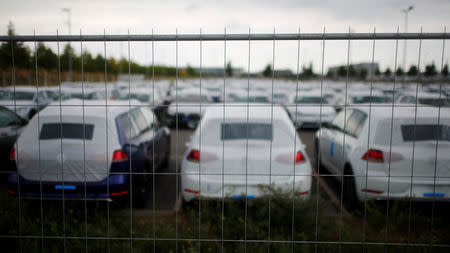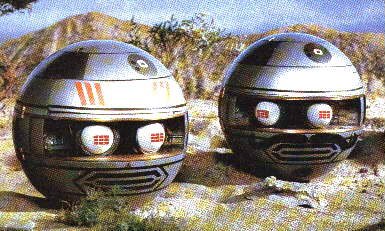Deleted member 103408
Guest
German carmakers have 50 percent chance of staying ahead, VW says
 Reuters 1 hour 6 minutes ago
Reuters 1 hour 6 minutes ago

New Volkswagen cars are seen at the Berlin Brandenburg international airport Willy Brandt (BER) in Schoenefeld, Germany, August 14, 2018. REUTERS/Hannibal Hanschke?
FRANKFURT (Reuters) - Germany's carmakers only have a 50 percent chance of surviving as leading players in the auto industry unless they transform to meet new regulations and adapt their supply chains, Volkswagen Chief Executive Herbert Diess said on Tuesday.
Some carmakers could be pushed out of business by reforms required to shift production to electric cars from vehicles running on combustion engines and by introducing the changes needed to tackle new geopolitical threats, he said.
"From today's point of view the chances are perhaps 50-50 that the German auto industry will still belong among the global elite in 10 years' time," he said, referring to Volkswagen Group, BMW and Daimler .
The intensifying push to cut carbon dioxide pollution and nitrogen oxide emissions amounted to a campaign against individual mobility and against cars, Diess said.
"We are all used to the fact that we have flourishing industrial metropolises around the central manufacturing plants of German carmakers and their suppliers, places where people like to live and work, but that's not guaranteed for eternity," Diess told an auto supplier conference in Wolfsburg.
"If you look at the former bastions of the auto industry like Detroit, Oxford-Cowley or Turin, you understand what happens to cities when once powerful corporations and leading industries falter," he added.
COST OF TRANSFORMATION
To cut average fleet emissions of carbon dioxide in Europe by 30 percent by 2030, Volkswagen needed to raise its share of electric vehicles to 30 percent of new car sales, Diess said.
Pollution from carbon dioxide, the main greenhouse gas blamed for global warming, would rise in Germany, given the country's dependence on generating electricity from brown coal, he said.
The shift from combustion engines to electric cars would also lead to the loss of 14,000 jobs at VW by 2020, Diess said, and require an overhaul of the carmaker's in-house components business.
VW's in-house components division, which eats up the lions share of the 170 billion euros spent on procurement, develops and builds car parts at 56 sites across the globe, employing around 80,000 people.
"From Jan. 1 onward, Volkswagen components will act as an economically independent entity," Diess said.
Each of the 56 plants would be free to evaluate partnerships and even to build components for other carmakers, Diess said.
 Reuters 1 hour 6 minutes ago
Reuters 1 hour 6 minutes ago- Reactions
- Reblog on Tumblr
- Share
- Tweet

New Volkswagen cars are seen at the Berlin Brandenburg international airport Willy Brandt (BER) in Schoenefeld, Germany, August 14, 2018. REUTERS/Hannibal Hanschke?
FRANKFURT (Reuters) - Germany's carmakers only have a 50 percent chance of surviving as leading players in the auto industry unless they transform to meet new regulations and adapt their supply chains, Volkswagen Chief Executive Herbert Diess said on Tuesday.
Some carmakers could be pushed out of business by reforms required to shift production to electric cars from vehicles running on combustion engines and by introducing the changes needed to tackle new geopolitical threats, he said.
"From today's point of view the chances are perhaps 50-50 that the German auto industry will still belong among the global elite in 10 years' time," he said, referring to Volkswagen Group, BMW and Daimler .
The intensifying push to cut carbon dioxide pollution and nitrogen oxide emissions amounted to a campaign against individual mobility and against cars, Diess said.
"We are all used to the fact that we have flourishing industrial metropolises around the central manufacturing plants of German carmakers and their suppliers, places where people like to live and work, but that's not guaranteed for eternity," Diess told an auto supplier conference in Wolfsburg.
"If you look at the former bastions of the auto industry like Detroit, Oxford-Cowley or Turin, you understand what happens to cities when once powerful corporations and leading industries falter," he added.
COST OF TRANSFORMATION
To cut average fleet emissions of carbon dioxide in Europe by 30 percent by 2030, Volkswagen needed to raise its share of electric vehicles to 30 percent of new car sales, Diess said.
Pollution from carbon dioxide, the main greenhouse gas blamed for global warming, would rise in Germany, given the country's dependence on generating electricity from brown coal, he said.
The shift from combustion engines to electric cars would also lead to the loss of 14,000 jobs at VW by 2020, Diess said, and require an overhaul of the carmaker's in-house components business.
VW's in-house components division, which eats up the lions share of the 170 billion euros spent on procurement, develops and builds car parts at 56 sites across the globe, employing around 80,000 people.
"From Jan. 1 onward, Volkswagen components will act as an economically independent entity," Diess said.
Each of the 56 plants would be free to evaluate partnerships and even to build components for other carmakers, Diess said.


